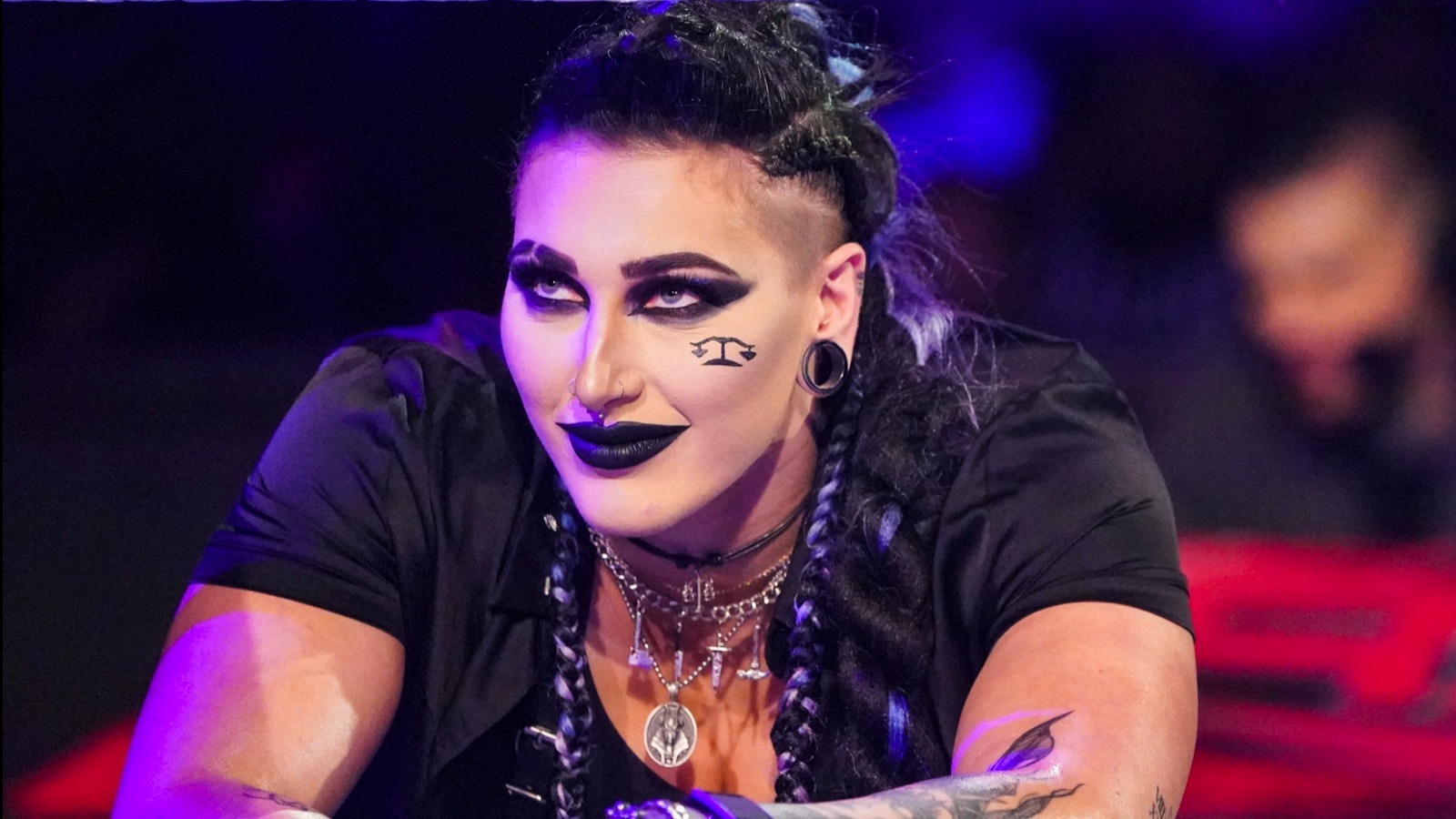Who Is Rhea Ripleys Husband
Rhea Ripley's Husband - Exploring the Connections
Many folks out there, it seems, are quite curious about the personal connections of popular figures, and one name that pops up a lot in those searches is Rhea Ripley. People often wonder about her life away from the spotlight, especially who might be her partner. This kind of curiosity is pretty natural, you know, when someone makes such an impression in their field. So, too it's almost, a lot of people are asking a very specific question, wanting to get a little more insight into her private world.
It turns out, when you start looking into the name "Rhea" and trying to figure out who might be "Rhea Ripley's husband," the information you come across can sometimes point in a slightly different direction. Our current collection of facts, for instance, talks about a figure named Rhea, but this particular Rhea comes from very old stories, the kind that were told a long, long time ago.
This other Rhea, as a matter of fact, is a really significant character in ancient tales. She is a powerful goddess, one of the original beings in a grand, sweeping narrative about the beginnings of the world. So, when people look for "Rhea Ripley's husband," they might encounter details about this mythological figure, which is quite a different story entirely.
Table of Contents
- A Look at the Name "Rhea" and Its Meanings
- Who Was Rhea in Ancient Stories - The Husband Question
- Rhea - Biographical Details from Ancient Tales
- What About Rhea's Family Connections and a Potential Husband?
- How Does Rhea Relate to Other Ancient Figures and "Rhea Ripley's Husband"?
- The Significance of Rhea in Mythology
- Is That Rhea Ripley's Husband?
- Understanding Different Figures Named Rhea
- The Enduring Presence of Rhea in Lore
A Look at the Name "Rhea" and Its Meanings
When we hear the name "Rhea," it turns out, there's more to it than meets the eye, especially if we consider its very old origins. Apparently, a very old thinker, Plato, in his work called Cratylus, had some thoughts on what the word "Rhea" truly meant. He put forward the idea that "Rhea" was a way of speaking, a feminine form, that came from an ancient Greek word. This old Greek word, "rheō," was all about movement. It meant something like "to flow," or "to discharge," or even "to stream."
So, in some respects, the very sound of the name "Rhea" carried with it a sense of motion, a feeling of things moving along, like a river. This idea of flowing could be quite interesting when you think about someone who is a powerful force, like a figure in ancient stories. It gives the name a sort of dynamic quality, a feeling of continuous movement or influence. This is, you know, a pretty deep way to think about a name.
This original meaning, tied to the concept of flow, might suggest something about the character or role of a figure bearing this name in old tales. It implies a connection to natural forces or perhaps a constant presence. It's a bit like, the name itself tells a tiny part of the story before you even get to the full narrative.
Who Was Rhea in Ancient Stories - The Husband Question
Now, when we shift our focus to the "Rhea" that appears in these very old narratives, we find a truly significant figure. She was one of the Titans, a group of powerful, original beings from the dawn of time in Greek mythology. The story goes that these Titans were the first children born from the earliest, most fundamental Greek deities: Uranus, who represented the sky, and Gaia, who represented the earth. So, Rhea was part of this first group of powerful, cosmic beings, which is pretty important.
Among these Titans, two stood out in particular as parents to a whole new set of gods and goddesses. These two were Cronus and Rhea. They became the mother and father of what people call the "original generation" of the Olympian gods. This means that if you're asking about a "Rhea" and a "husband" in this context, Cronus is the one who fits that description for the mythological Rhea. He was her brother, as well as her partner, which was a common arrangement in these ancient, foundational stories.
Their story is, you know, quite a dramatic one, full of power struggles and the shaping of the world as it was known. Rhea, in these tales, plays a very important part in the continuation of the divine lineage, ensuring that new gods would come into being. She is often seen as a mother figure, a source of new life and the protector of her offspring, even in the face of great danger.
Rhea - Biographical Details from Ancient Tales
To give a clearer picture of this ancient figure, Rhea, we can put together some of the details that come from the old stories. This information, you see, helps us to understand her role and her connections within that mythological world. It's not about a modern personality, but rather a character from tales that have been passed down through countless generations.
| Detail | Description from Ancient Texts |
|---|---|
| Name Origin | A feminine form of the ancient Greek verb "rheō," meaning "flow," "discharge," or "stream," as suggested by Plato. |
| Parents | Uranus (Sky) and Gaia (Earth), the primordial Greek deities. |
| Group Affiliation | One of the Titans, the first generation of powerful divine beings. |
| Partner/Husband | Cronus, who was also her brother. |
| Children (with Cronus) | Demeter, Zeus, Hestia, Hera, Hades, and Poseidon (the original Olympian gods). |
| Other Notable Children | Persephone (daughter of Zeus and Rhea in some versions, like the Orphic tradition). |
| Key Role | Mother of the Olympian gods; often associated with other mother goddesses like Cybele and Demeter. |
| Significant Act | Presented Cronus with a stone wrapped in cloth to save her child, Zeus, from being swallowed. |
| Later Actions | Incited Cronus and other Titans to wage war against Ammon; her son Dionysus eventually ended Cronus's rule. |
This table, you know, really lays out the fundamental facts about Rhea from the ancient stories. It paints a picture of a figure deeply connected to the very foundations of the Greek pantheon.
What About Rhea's Family Connections and a Potential Husband?
When you look at Rhea's family tree in these old tales, it's quite extensive and, in some ways, rather interconnected. As one of the Titans, she had many brothers and sisters, all children of Uranus and Gaia. These included Coeus, Crius, Hyperion, Iapetus, Oceanus, Mnemosyne, Phoebe, Tethys, and Themis. And, of course, there was Cronus, who was not just her brother but also her partner. This kind of family arrangement, where siblings married, was, you know, a common theme in the earliest divine generations of Greek mythology.
So, if the question is about "Rhea's husband" in this mythological context, Cronus is the definite answer. Their relationship was central to the unfolding of the divine narrative. They were the parents of the next major group of gods, the Olympians, who would eventually take over from the Titans. This makes their union incredibly significant for the whole structure of the mythological world.
The children they had together were, you know, some of the most famous figures in all of Greek mythology. Demeter, Zeus, Hestia, Hera, Hades, and Poseidon all came from the union of Cronus and Rhea. This means Rhea is essentially the grandmother of many important divine figures, making her a very central figure in the lineage of the gods.
How Does Rhea Relate to Other Ancient Figures and "Rhea Ripley's Husband"?
Rhea, the ancient goddess, wasn't just a stand-alone figure; she was often connected or even seen as the same as other mother goddesses from different cultures. For example, a goddess known as Cybele, who was known in Greece from a very early period, was often thought to be the same as Rhea. She was also sometimes identified with Demeter, another very important goddess of the harvest and fertility. This kind of identification shows how important the concept of a "mother goddess" was across different traditions.
Cybele, in her depictions, was typically imagined riding in a lion-drawn chariot, which paints a very powerful picture. This connection to other mother figures really highlights Rhea's role as a nurturing, life-giving force in the ancient belief systems. She was a symbol of the earth's fertility and the cycle of life.
When people ask about "Rhea Ripley's husband," it's clear they are looking for information about a modern personality. However, the details available to us point to this ancient figure, Rhea, who had a partner in Cronus and a vast network of divine relatives. The connection here is simply the name "Rhea," which has a long and rich history in storytelling. There is no information that connects the mythological Rhea or her husband to the person known as Rhea Ripley.
The Significance of Rhea in Mythology
Rhea's place in ancient mythology is, you know, quite profound. She is not just a mother figure; she plays a pivotal part in the transition of power from the Titans to the Olympians. One of the most famous stories involving Rhea shows her quick thinking and determination. Her partner, Cronus, had a habit of swallowing his children as soon as they were born, fearing that one of them would overthrow him, just as he had overthrown his own father, Uranus.
To save her youngest child, Zeus, Rhea came up with a plan. She presented Cronus with a stone that was wrapped in cloth, making it look like a baby. Cronus, unsuspecting, swallowed the stone instead. This act, captured in woodcut engravings like the one from August Heinrich Petiscus's 1878 work, "Olympus or the Mythology of the Greeks and Romans," is a testament to her protective nature. It shows her desire to preserve her lineage and ensure the future of the gods.
Later on, Rhea also played a part in encouraging Cronus and the other Titans to go to war against Ammon, another figure in some versions of these tales. Ammon, it is said, eventually fled to Crete. And, eventually, it was Cronus's son, Dionysus, who brought an end to Cronus's oppressive rule. So, Rhea was not just a passive figure; she had a hand in shaping the events that led to the establishment of the Olympian order. Her actions were, you know, pretty important for the overall story.
Is That Rhea Ripley's Husband?
It's important to be clear about this: the information we have, which describes Rhea as a Titan goddess, the partner of Cronus, and the mother of Zeus and other Olympians, is from ancient Greek mythology. This information does not, in any way, refer to the modern public figure known as Rhea Ripley. So, if someone is searching for "Rhea Ripley's husband," the mythological details about Cronus are not the answer they are looking for.
The name "Rhea" is, of course, used in different contexts across time and cultures. Just because two individuals share a name does not mean they are the same person or that their personal lives are connected. The "My text" provided to us speaks solely of the mythological Rhea, her origins, her family, and her role in ancient stories. There is, actually, no mention of Rhea Ripley or any details about her personal relationships within that text.
So, to be absolutely direct, the mythological Cronus, the Titan, is not "Rhea Ripley's husband." These are two entirely separate figures from very different times and contexts. One exists in the realm of ancient tales, while the other is a contemporary personality.
Understanding Different Figures Named Rhea
It's quite common, you know, for names to appear in various stories and across different periods. The name "Rhea" is a good example of this. We have the ancient Greek goddess, a powerful figure in the creation myths, and then we have modern individuals who bear the same name. It's like, the name itself has a long history, but the people who carry it are distinct.
For instance, even within ancient mythology, there were sometimes different versions of stories that involved a "Rhea." One example is the story of Persephone. While she is most famously known as the daughter of Demeter, some older, less common versions, like the Orphic tradition, suggested that Persephone was actually a daughter of Zeus and Rhea. This shows how even within the same body of mythology, details could vary.
Then there's an Arcadian version of Persephone, who was called Despoina, and she was considered the daughter of Demeter. These variations highlight that even in ancient times, the stories were not always fixed, and different traditions held different details. This makes it, you know, pretty important to specify which "Rhea" one is talking about.
The Enduring Presence of Rhea in Lore
The figure of Rhea, the Greek goddess, has certainly left a lasting mark on human culture and storytelling. Her story, as the mother of the Olympian gods, is fundamental to understanding the ancient Greek pantheon. Her struggle against Cronus to protect her children is a powerful narrative about maternal strength and the fight for the future. She represents, in a way, the very force of creation and continuity.
Her identification with other mother goddesses, like Cybele, also shows her broad influence across different ancient belief systems. This connection speaks to a shared human need to understand origins and the forces that govern the world. She is, basically, a symbol of motherhood and the earth's nurturing power.
So, while the initial question about "Rhea Ripley's husband" points to a modern person, the name "Rhea" itself has a deep and rich history, rooted in tales of primordial gods and the very beginnings of the cosmos. The information available from the provided text focuses entirely on this ancient, mythological figure and her significant role in shaping the world of the gods.

Rhea Ripley’s Black Engagement Ring

Rhea Ripley's husband Buddy Matthews sends her a wholesome message

WWE Announces Rhea Ripley's First Match On Raw In Five Months